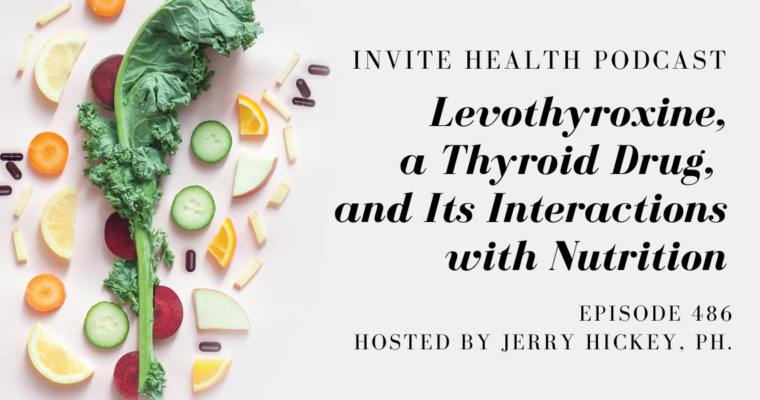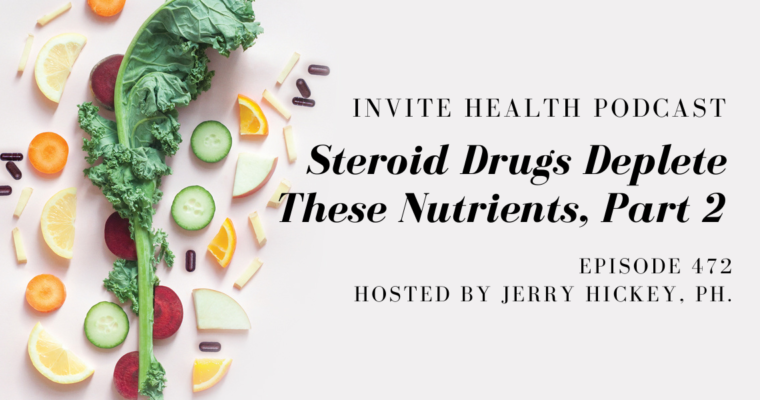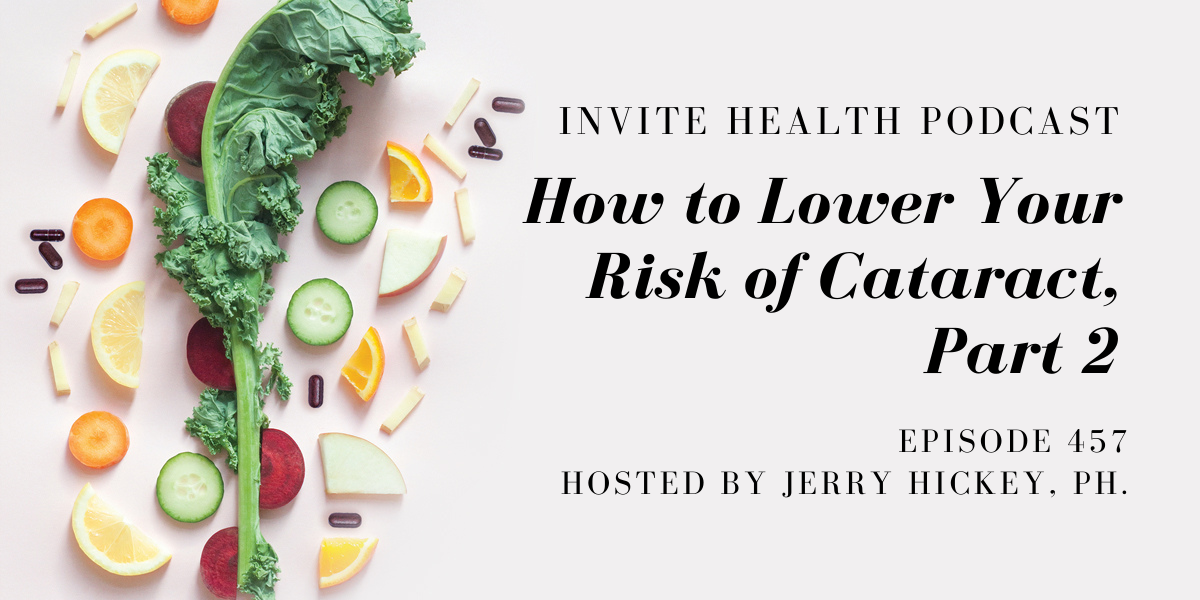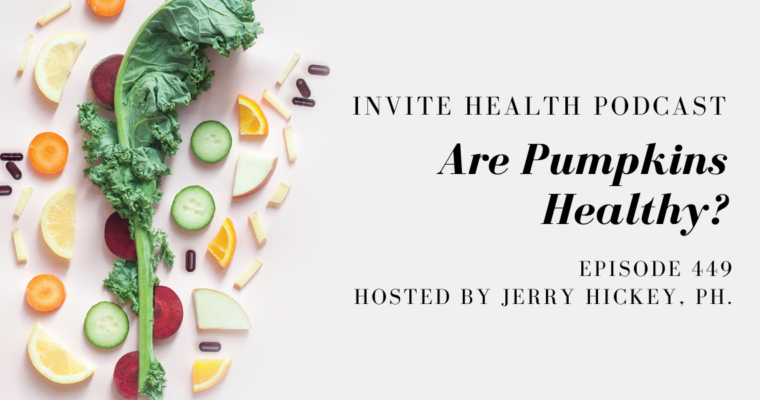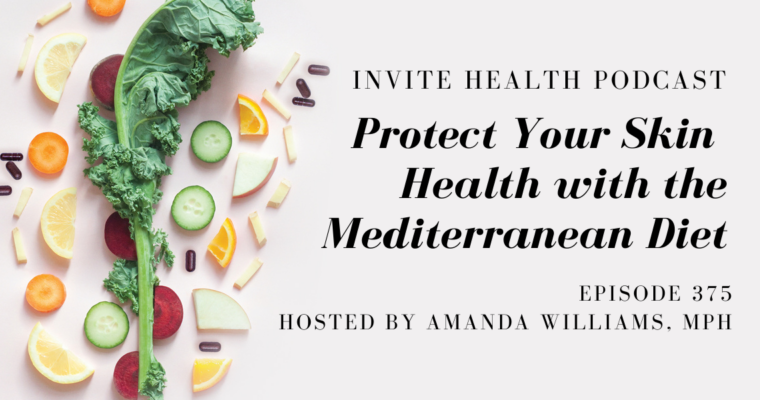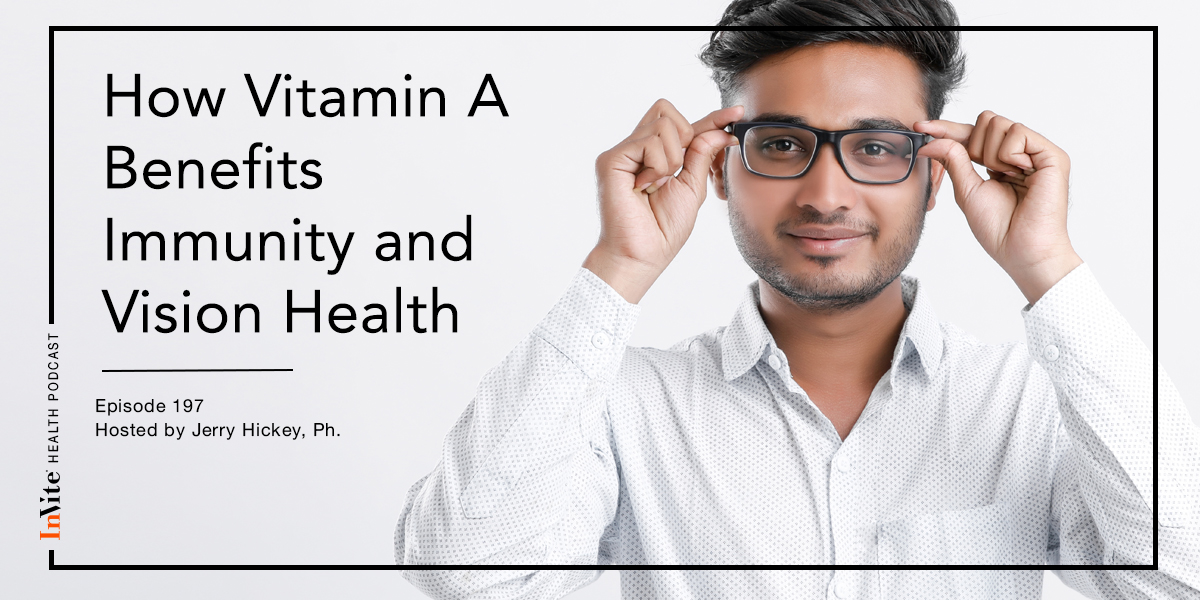Invite Health Podcast, Episode hosted by Jerry Hickey. Ph
Subscribe Today!
Vitamin A is required for vision, thyroid function, the creation of healthy cells, immune system function, and the function of our steroid hormones.
The term Vitamin A is a generic term and it refers to both the active and the inactive forms. The active form of Vitamin A found in meat and dairy is known as Retinol and the inactive form, called Beta-Carotene, is found in fruits and vegetables. This is an important distinction. Too much of the preformed active form of Vitamin A can be toxic. Beta-Carotene is not yet active and has to be converted into the active form of Vitamin A. Your body has a feedback mechanism. If it sees there’s too much active Vitamin A in the bloodstream already, it slows down the production of Vitamin A out of Beta-Carotene.
There are hundreds of carotenoids in plants. They are pigments giving plants their rich reds, oranges, and yellows. Only 3 of them are converted into Vitamin A, the main one being Beta-Carotene. Our body can also convert Alpha-Carotene and Beta-Cryptoxanthin into Vitamin A.
VITAMIN A AND IMMUNITY
Let’s discuss Vitamin A and immunity. Our skin is a barrier to infection and Vitamin A is required to make skin because Vitamin A is involved with making virtually all cells in our body. Mucosal cells line our respiratory tract, including our lungs. They also line our digestive tract and our urinary tract. Mucosal cells function as a first line of defense against viruses, bacteria, and other infections. Retinoic Acid, one of the forms of Vitamin A, is produced by immune cells in these tissues. These immune cells include macrophages and dendritic cells. These are the early cells that react to viral infections. If they do their job, it prevents the virus from becoming very dangerous. Dendritic cells act as messengers for the immune system. Vitamin A allows these cells to present the infectious microbe to our T-cells. T-Cells run the immune system, allowing the destruction of the harmful organism. T-cells require Vitamin A to mature into their proper-infection fighting or immune system controlling forms.†
How To Boost Your Seasonal Immune Support – InVite Health Podcast, Episode 193. Listen Now >>
Vitamin A is stored in the liver. People with low reserves of Vitamin A stored in their liver can have reduced levels of Retinol in their circulation, making them more susceptible to infections. It is important to note that there is evidence that patients with underactive thyroid glands and possibly diabetics also are not efficient at converting Beta-Carotene into Vitamin A, so they may require a low dosage of preformed Vitamin A as a supplement.†

VITAMIN A AND VISION
Our retina is in the back of our eyes and it has rod and cone cells. Rod cells detect motion and also allow you to see in low light, such as at night. A form of Vitamin A attaches to a protein called opsin and this forms rhodopsin, also called visual purple. This rhodopsin is needed for fine vision and also for night vision. When a molecule of light, called a photon, hits the rod cell, it affects the Vitamin A, sending a signal to the brain allowing you to see. These cells do not detect color and that is why there is no color in low light.†
Bilberry Fruit: The Forgotten Berry – Invite Health Podcast, Episode 145. Listen Now >>
Cone cells in the retina contain red, green, and blue opsin proteins. Photons of color from the visible light spectrum interact in a similar way with vitamin A and pigment so you see colors.
Vitamin A is required for normal function of the retina, for night vision, and for color vision and a low level of Vitamin A affects your ability to see in low light. The most common cause of blindness is due to low levels of Vitamin A. About 250,000 to 500,000 children go blind each year in poorer countries due to a lack of Vitamin A in their diet. To learn more about other functions of Vitamin A in the body, tune into the full podcast episode.†
What are some sources of Vitamin A?
- Preformed Vitamin A is found in eggs, meat, fatty fish, and dairy including whole milk and butter.
- Beta-Carotene is readily available from many vegetables and also fruits, but especially from sweet potatoes, pumpkins, carrots, cantaloupes, spinach, kale, and squash.
- For preformed Vitamin A supplements, do not take more than 5,000 IU in any single day and never take synthetic Beta-Carotene.
Thank you for tuning in to the Invite Health Podcast. You can find all of our episodes for free wherever you listen to podcasts or by visiting www.invitehealth.com/podcast. Make sure you subscribe and leave us a review! Follow us on Facebook, Twitter and Instagram at Invite Health today. We’ll see you next time on another episode of the Invite Health Podcast.


